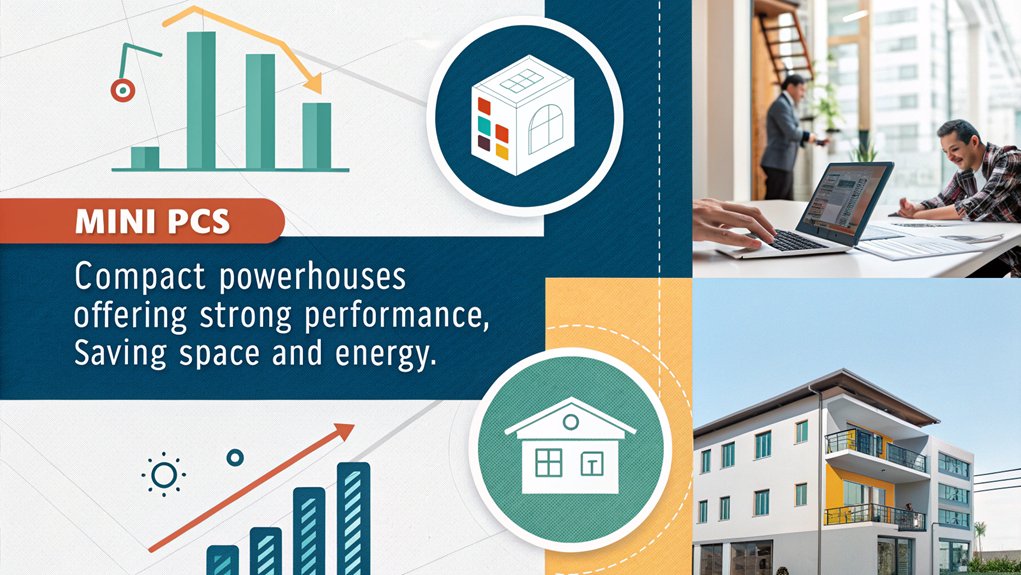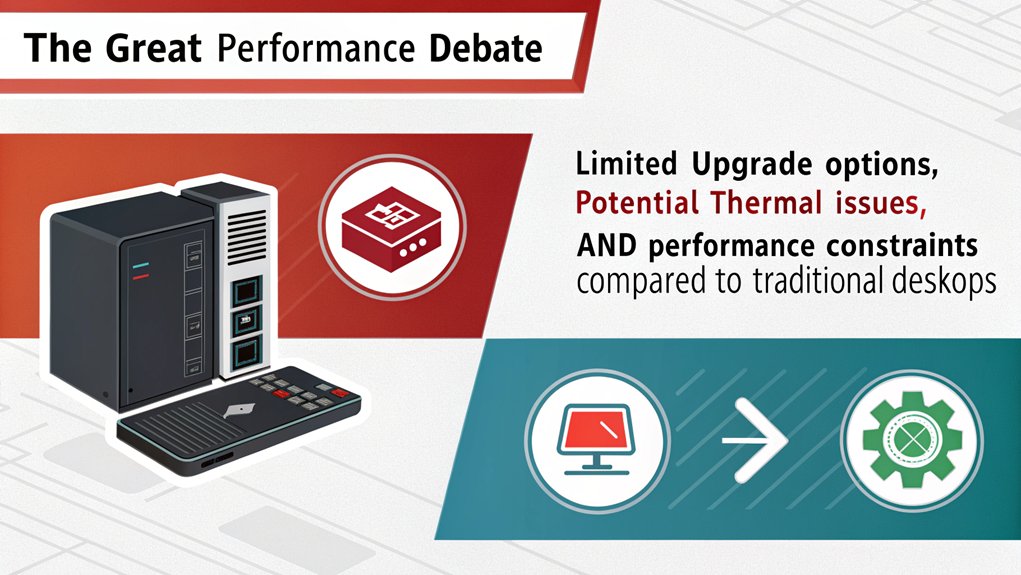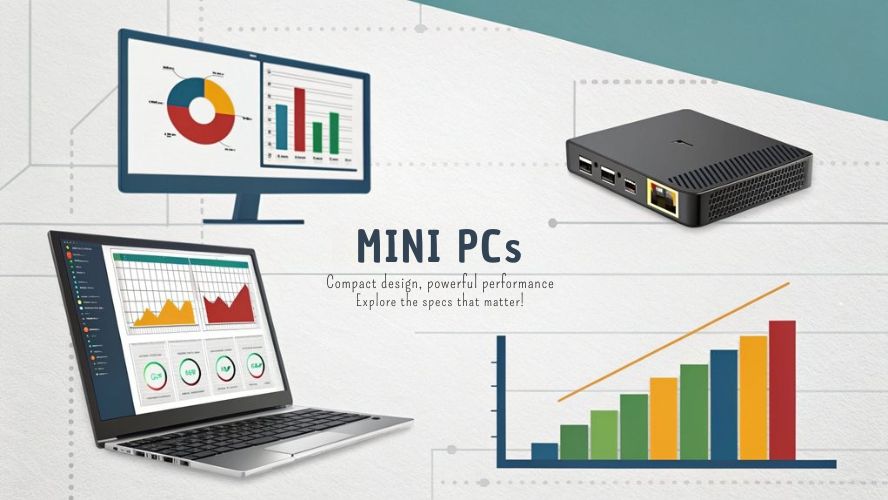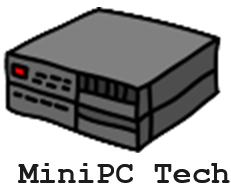When considering Mini PCs, you’re entering a debate over performance versus portability. These compact devices pack multi-core processors, SSDs, and ample RAM, making them efficient for many daily tasks. They’re energy-efficient and cost-effective too, but performance can lag with heavy applications, and upgrade options are limited. Heat management can also be a concern under load. Ultimately, if you’re after a space-saving solution without compromising too much on power. So, there are Mini PC advantages and disadvantages, so can Mini PCs meet your needs? For a deeper understanding of choosing the right one for you, there’s more to explore on this topic.
Key Takeaways
- Mini PCs offer impressive performance through multi-core processors and SSDs, making them suitable for various applications despite their compact size.
- Performance may falter with resource-heavy applications, limiting their usability for high-demand tasks compared to traditional PCs.
- Upgrade limitations, due to soldered components, can hinder the ability to enhance performance as user needs evolve over time.
- Effective cooling systems are essential, as thermal constraints can lead to overheating under sustained heavy loads, affecting performance.
- Future advancements in CPUs, GPUs, and connectivity options promise to enhance performance and versatility in mini PCs for diverse user needs.
Overview of Mini PCs

When you’re looking for a powerful yet compact computing solution, mini PCs offer a compelling option.
These innovative devices have surged in popularity due to their ability to deliver impressive performance without consuming much space.
Mini PC trends showcase the evolution of these machines, incorporating cutting-edge technology that rivals traditional desktops. You’ll find them equipped with multi-core processors, high-speed SSDs, and ample RAM, making them suitable for various applications.
Mini PC innovations also focus on energy efficiency, allowing you to enjoy robust computing while minimizing your carbon footprint. Their energy-efficient design not only reduces power consumption but also contributes to long-term savings on energy bills.
As industries adopt these compact powerhouses, you’ll see their versatility in sectors like healthcare, finance, and remote work, solidifying their role in the modern computing landscape.
Advantages of Mini PCs

Mini PCs stand out for several key advantages that make them an appealing choice for many users. Their portability features allow you to easily transport them, fitting snugly into your bag. With impressive energy efficiency, these devices consume less power, leading to cost savings and a smaller carbon footprint. Plus, they’re generally more affordable than traditional desktops or laptops with similar performance, maximizing your investment.
Here’s a quick overview of the mini PC benefits:
| Advantage | Description | Impact |
|---|---|---|
| Portability | Fits in bags, easy to move | Ideal for on-the-go users |
| Energy Efficiency | Lower power consumption | Reduced electricity costs |
| Cost-Effectiveness | More affordable than traditional PCs | Budget-friendly option |
| Compact Design | Space-saving, flexible setups | Perfect for small spaces |
Additionally, their energy-efficient components contribute to eco-friendly practices, aligning with businesses’ sustainability goals.
Disadvantages of Mini PCs

While the advantages of mini PCs are compelling, there are notable disadvantages that shouldn’t be overlooked.
You may encounter performance issues when running resource-intensive applications, as these compact devices often struggle under heavy workloads. Additionally, upgrade limitations can hinder your ability to keep pace with technological advancements, as many mini PCs come with soldered components that aren’t easily replaceable. This can restrict your customization options, leaving you with fewer choices to tailor the hardware to your specific needs.
- Limited upgradability can stifle future-proofing.
- Thermal limitations may lead to overheating during intensive tasks.
- Peripheral compatibility might require extra adapters for seamless connectivity. Furthermore, the effective cooling systems are necessary for sustained performance but may not always be adequate in mini PCs.
Consider these factors carefully before making a switch to guarantee it aligns with your innovative aspirations.
Technical Specifications

Understanding the technical specifications of mini PCs is essential for confirming they meet your specific needs, especially given their limitations.
When evaluating performance metrics, focus on multi-core processors with high clock speeds, at least 8GB of RAM, and SSDs for faster data access. These elements greatly influence your mini PC’s efficiency and responsiveness.
Moreover, consider hardware compatibility; not all peripherals work seamlessly with every mini PC.
You’ll want to confirm that any connectivity needs align with the specifications of your chosen device. This attention to detail can help you avoid performance bottlenecks and maximize the innovative potential of your mini PC, whether for gaming, media consumption, or professional tasks. Additionally, the rise of AI integration is expected to optimize resource allocation and streamline workflows, further enhancing performance in mini PC environments.
Real-World Applications

Real-world applications of mini PCs showcase their versatility across various sectors, proving they’re more than just compact devices.
In industrial automation, mini PCs can streamline process control, making operations more efficient. In healthcare solutions, they enable real-time patient monitoring, enhancing care quality and response times.
Here are a few innovative uses:
- Smart factories: Automate production lines with mini PCs managing machinery and data flow.
- Telemedicine: Facilitate remote consultations and patient tracking for healthcare providers.
- Financial analysis: Support data crunching in compact workspaces, optimizing space and performance.
These examples illustrate how mini PCs are revolutionizing various industries, proving that size doesn’t compromise capability. Additionally, their upgrade potential allows for tailored configurations to meet specific workload demands.
Embrace the innovation they bring to your professional environment.
Selecting the Right Mini PC

How do you choose the right mini PC for your needs? Start by identifying your primary use cases—whether it’s gaming, media streaming, or virtualization.
Focus on hardware specifications that enhance your user experience. For gaming, seek high-performance CPUs and dedicated graphics. For virtualization, prioritize multi-core processors and SSDs for rapid data access.
Next, consider system compatibility; confirm the mini PC can seamlessly integrate with your existing peripherals.
Factor in upgrade potential, as some models may limit future enhancements. Additionally, keep in mind the importance of cooling systems to ensure optimal performance and longevity.
Finally, read reviews and user feedback to gauge real-world performance. By aligning your requirements with the right specifications, you’ll guarantee a mini PC that not only meets your needs but also enhances your overall digital experience.
Future of Mini PCs

What does the future hold for mini PCs as technology continues to evolve? As you explore this exciting landscape, expect remarkable performance upgrades and innovative designs that cater to emerging market trends.
Mini PCs will likely become increasingly powerful and versatile, enabling you to tackle resource-intensive tasks with ease.
- Enhanced processing power with advanced CPUs and GPUs
- Expanded connectivity options, including 5G and Wi-Fi 6
- Greater customization to suit individual user needs
With these developments, mini PCs will redefine their role in both professional and personal settings. Additionally, they will emphasize cost-effectiveness while ensuring essential features to meet the growing demands of educational environments.
You’ll find them seamlessly integrated into smart homes, workplaces, and creative spaces, proving that compact devices can indeed deliver big performance.
Stay tuned; the future of mini PCs looks incredibly promising!
Frequently Asked Questions
Can Mini PCS Support Multiple Monitors Effectively?
Yes, mini PCs can support multi display setups effectively, but it depends on their graphics performance. Confirm you choose models with adequate GPUs to handle multiple monitors without compromising your overall computing experience.
What Operating Systems Can Be Installed on Mini PCS?
You can install various operating systems on mini PCs, including Linux for its compatibility and Windows for its versatility. Choose based on your needs, whether innovation-driven development or seamless everyday usage is your goal.
Are Mini PCS Suitable for Gaming at High Settings?
If you’re eyeing high-end graphics for gaming, mini PCs might struggle with demanding settings. Their compact design often limits cooling and performance, so you’ll need to weigh gaming performance against your portability needs.
How Do Mini PCS Compare to Traditional Laptops?
When comparing mini PCs to traditional laptops, you’ll notice form factor advantages like compactness and portability considerations. Mini PCs excel in space efficiency, making them perfect for innovative setups without sacrificing performance in various applications.
What Maintenance Is Required for Mini PCs?
Mini PCs are like small rockets zooming through tasks! To keep yours in prime shape, use effective cleaning techniques and consider hardware upgrades. Regular maintenance guarantees peak performance, enhancing your innovative experience with these powerful machines.
Conclusion
In closing, mini PCs present a delightful blend of efficiency and versatility, making them an appealing choice for those seeking to optimize their computing experience. While they may not possess the expansive capabilities of traditional desktops, their compact nature and impressive performance can certainly elevate your daily tasks. By carefully considering your specific needs and preferences, you can effortlessly embrace the future of computing with a well-chosen mini PC that suits your lifestyle.

I am a retired software engineer with experience in a multitude of areas including managing AWS and VMWare development environments. I bought a relative a mini-PC a year ago and have become passionate about the technology and its potential to change how we deploy software.

